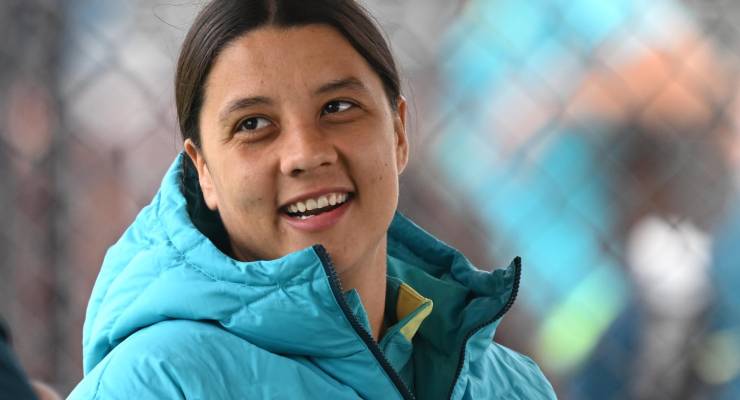
WALTZ IN MATILDAS!
All eyes are on the Matildas and star striker Sam Kerr as the Aussies get ready to face Denmark tonight in a make-or-break game for both soccer teams. The winner will make it to the quarter-finals of the FIFA Women’s World Cup, and the loser will be out of the competition. The newspapers are filled with speculation this morning about whether or not Kerr, who suffered a calf injury and has missed every game so far, will be fit to play.
“Unless [head coach] Tony Gustavsson is pulling a swifty on us all — and that can’t be ruled out — his skipper will probably come off the bench, and only if the Matildas need her,” reports The Sydney Morning Herald ($). The Daily Telegraph, meanwhile, featured a picture of Kerr on an exercise bike on its front cover this morning, reporting Gustavsson had met with medical staff to devise a playing plan for Kerr. Online, The Daily Telegraph ($) published exclusive helicopter footage that showed Kerr “sitting out the majority of training” on Sunday, “deepening the mystery” of her condition. Gustavsson laughed off the helicopter intrusion with a dad joke: “The interest [in the team] has gone sky high.”
Speaking of Gustavsson, his native Sweden beat current champions USA yesterday in a match that could not have been closer: the winning Swedish penalty ball crossed the goal line by only a few millimetres, as Guardian Australia reported. Japan, Spain and the Netherlands have also made it to the quarter finals. If the Matildas beat Denmark, they’ll face either France or Morocco.
ALBO’S STATEMENT FROM THE HEART
Australians have only one chance to vote for constitutional recognition and a First Nations Voice — and would have “everything to gain” from choosing to do so — the prime minister has said in a series of interviews at the Garma Festival in north-east Arnhem Land at the weekend. “I think people do want to see Indigenous Australians have the same opportunity as non-Indigenous Australians, they do want to close the gap,” Anthony Albanese told The Daily Telegraph ($). “But if we do the same thing, we should expect the same outcomes. That’s why Australians have an opportunity to either vote No for the status quo, or Yes to reach for the stars, to go through a better way.”
Speaking to the ABC’s Insiders program, Albanese said the vote represented a “once-in-a-generation opportunity”. To Sky News, the PM said the only difference between his view and that of Peter Dutton — who he characterised as wanting constitutional recognition and a legislated Voice — was that Dutton believed enshrining the body in the constitution would mean “it can’t be gotten rid of with the stroke of a pen. “And that’s precisely why Indigenous Australians have asked that it be enshrined in the constitution,” Albanese said.
In an interview with The Australian ($), Albanese said Australians shouldn’t fear that a Yes vote would set the stage for a Makarrata commission, a treaty process that’s the second stage of the Uluru Statement from the Heart. “All that makarrata represents is a Yolgnu word for dialogue, basically, coming together, literally coming together after a struggle. And no-one can say there hasn’t been a struggle.”
Also from Garma, The Sydney Morning Herald and The Age ($) reported Yes campaigner Noel Pearson saying that if the referendum delivers a Yes result, a Voice could be up and running within this term of government: “If we worked hard, we could have legislation within 12, 18 months of passage of the referendum.”
Today’s Worm comes to you from Anton Nilsson, filling in for Emma Elsworthy for the rest of the week while she enjoys some time off with family.
Say What?
Having now read the report, I dispute many of its adverse findings about me. While I acknowledge I made mistakes, I strongly dispute that I engaged in deliberate or underhanded conduct in the trial or that I was dishonest.
Shane Drumgold
The outgoing top ACT prosecutor has disputed many of the adverse findings of an inquiry into his handling of the Bruce Lehrmann case. He released a statement on Sunday in which he claimed he was denied procedural fairness due to the alleged pre-emptive leak of the report to selected media. He acknowledged his conduct was “less than perfect”, but said he acted in good faith at all times.
CRIKEY RECAP
“From age-old spin to causing deliberate harm, a new shamelessness is permeating Australian politics — and it’s determined to replace fairness with ugliness. We’ve seen it in attempts to delegitimise anti-corruption commissions. We’ve seen it in dismissive responses to the robodebt royal commission’s report. And we’re seeing it in spades around the Indigenous Voice to Parliament campaigns.
“So what does this new shamelessness look like? How is it different from the shamelessness that’s characterised politics since time immemorial? And what’s at stake for Australia? Let’s start with this week’s new lows: on Monday, former prime minister Scott Morrison claimed that the robodebt commission’s findings were part of a ‘campaign of political lynching’ targeting him, dismissing the inquiry as a ‘quasi-legal process’.”
“Did you know there’s an unregulated monopolist in our aviation sector with ‘a track record of using their market power, with the current regulatory regime providing no constraint on monopoly behaviour or providing any incentive to lower costs or improve quality’? That’s according to Qantas’ submission earlier this year to the Abanese government on the aviation white paper currently being developed within the infrastructure portfolio.
“Is Qantas referring to itself? Heavens no! In fact, ‘Australia is one of the most liberalised aviation markets in the world and Australian airlines operate in a highly competitive environment. This competition compels the sector to invest and innovate to reduce costs and deliver better service and products to consumers.’ The unregulated monopolists are airports, according to Qantas. Stop laughing, everyone.”
READ ALL ABOUT IT
ACT top prosecutor Shane Drumgold hits back against inquiry after resignation (SMH) ($)
A deadline arrives for Niger’s junta to reinstate the president. Citizens cheer and fear what’s next (Associated Press)
Imran Khan: is his political future over now he is in jail? (BBC)
Are Republican voters tiring of the war on ‘wokeness’? (The New York Times) ($)
Mike Pence would be ‘best witness’ in Donald Trump election conspiracy trial, attorney says (The Guardian)
Explosions hit road bridges between Crimea and occupied Ukraine (CNN)
THE COMMENTARIAT
Why you should and shouldn’t believe what you’re told about inflation — Ross Gittins (SMH) ($): “If you don’t believe prices have risen as little as the official figures say, I have good news and bad. The good news is that most Australians agree with you. The bad news is that, with two important qualifications, you’re wrong. Last week the officials — the Australian Bureau of Statistics — reminded us of a truth that economists and the media usually gloss over: the rate of inflation, as measured by the consumer price index, can be an unreliable guide to the cost of living. Especially now.
“But first, many people who go to the supermarket every week are convinced they know from personal experience that prices are rising faster than the CPI claims. Wrong. Your recollection of the price rises you’ve noticed at the supermarket recently is an utterly unreliable guide to what’s been happening to consumer prices generally.”
Let’s drop the fake nuclear panic and power up — Tim Blair (The Daily Telegraph) ($): “Hard to imagine, but there is something worse than cowardice. And that is someone who pretends to be a coward. Harder still to imagine why someone would fake their fear, but it’s been happening here for decades. Every time nuclear energy is mentioned anti-nuclear Australians scream about the dangers: meltdowns, radioactivity, rivers of toxic waste and so on.
“They know none of these concerns are statistically or technologically realistic. And they know their own panic is a pose. They’re fright frauds. Imitation invertebrates. If not outright scaredy-cats, they’re at least atomic kittens. France is loaded with nuclear plants. Dozens of the things are scattered across a landmass barely one-fourteenth the size of Australia — yet there is no chance in hell of any anti-nuke lefty ever knocking back a free flight to Paris.”
Between the World Cup and Barbie, we’re finally having an honest discussion about girlhood – Van Badham (Guardian Australia): “The tears came the night the Australians beat Canada in the Women’s World Cup. It wasn’t at the beginning of the match, with anxiety, when the Matildas marched out to play knowing the match was do-or-die for their World Cup hopes, star skipper Sam Kerr on the bench and not quite — not yet — recovered from injury. It wasn’t with relief at the nine-minute mark, when Australia’s Hayley Raso scored that first, dam-busting goal.
“I wasn’t even crying about the game. What had me reaching for tissues was a brief cutaway shot of the crowd, broadcast at some point between Raso’s first beautiful goal and her second beautiful goal. The camera had found the faces of some Australian girls — maybe 11 years old — in the stands. They were decked in Australia’s green-and-gold colours, cheeks and foreheads smeared with matching paint.”










Wow I should start reading the Telegraph.
As a general rule the more a person claims to be concerned about climate change the more they are opposed to nuclear….
It’s like fast food companies who promote exercise for a healthy lifestyle.
Or that “…. Gamble responsibly” (with us) mob?
As much as it’s overdue (to get up), I reckon Albaneses is dead right about (most?) Australians wanting Indigenous Australians to have the same opportunities (of which they’ve been largely deprived for too long) : but I also reckon there’s a lot who are quite happy to remain on the positive side of that ‘status quo ledger’ – as the NO campaign (waging their ideological/revenge war for whatever reasons) gives them excuses, to vote accordingly.
The consternation in the “alternate universe” media – at this being Albanese’s ‘only chance we’re going to get’ to fix the present lop-sided system? …. What other choice(s) are there, in any other foreseeable future? …. Some sort of “possible agreement” – on a mutated variant? …. Across this great divide being played on?
Was yesterday’s Insiders a bit surreal? There they were, Speers, Armstrong, Janke and Bouchier, talking about the way Dutton and that cohort were playing politics with this issue : and Armstrong (News Corporation, the Teletrash no less, “insider”?) wasn’t asked about the m.o. way elements in that media influencer giant, she works for, are playing the same “wingperson” politics they are (for the NO campaign), with it? The sort of factoid element they’re playing up – where no amount of “explanation” (they’re always demanding) will be enough to supposedly change their minds – because their political agenda is set in political stone (age?).
Dutton’s excuse that he wasn’t going to go to Garma to be “someone he’s not”? …. ‘Because he leaves that confection up to Limited News PR puff-pastry sous chefs’? Again, no questions of “insider” Armstrong about that Limited News m.o?
“Insiders”? With no questions at all about the way the Limited News media has played this campaign? The demographic they’ve played to, encouraged, misled and ‘fed’?
It did stand out, klewso. A bit like a sore thumb. But then it always does.
You have a ‘discussion’ about the ‘present, lop-sided system,’ its causes and how we might fix it, and don’t interrogate a representative of the major disruptor, who is sitting directly in front of you?
It’s not their fault…. It’s that alternate No Responsibilities universe much of the media inhabits – away from us Earthlings.